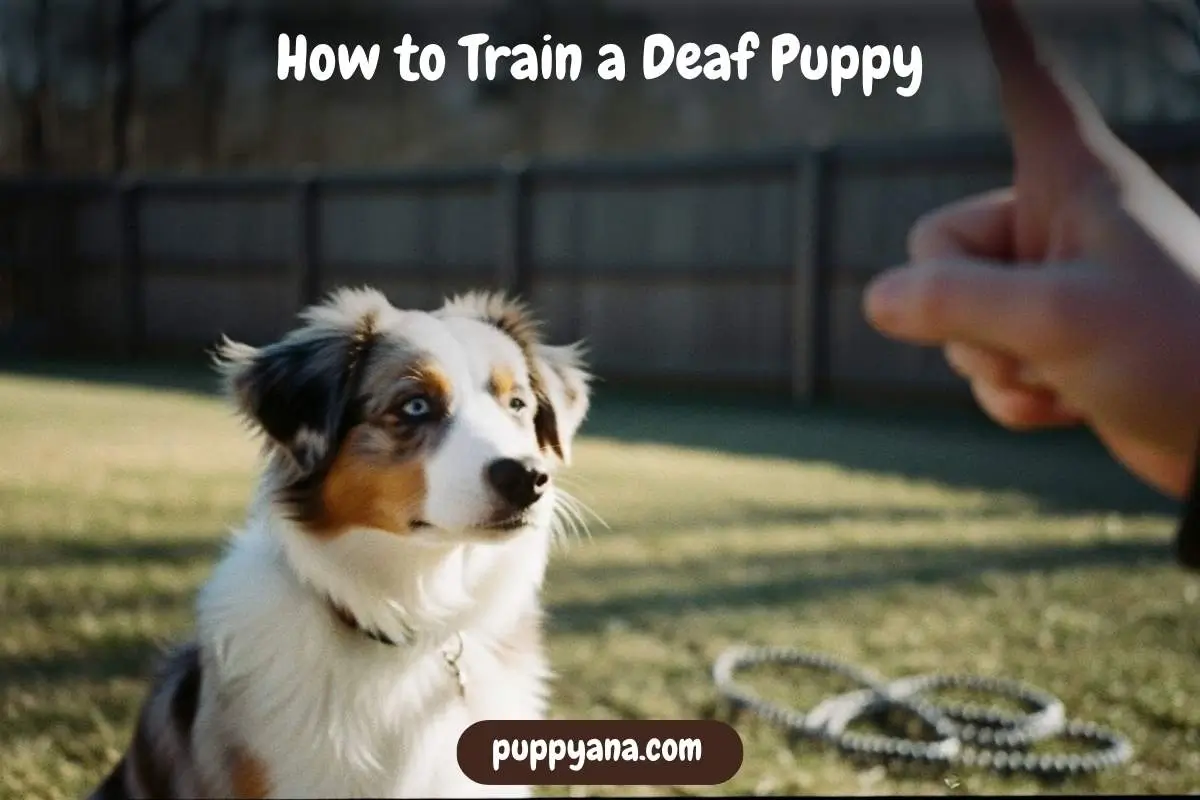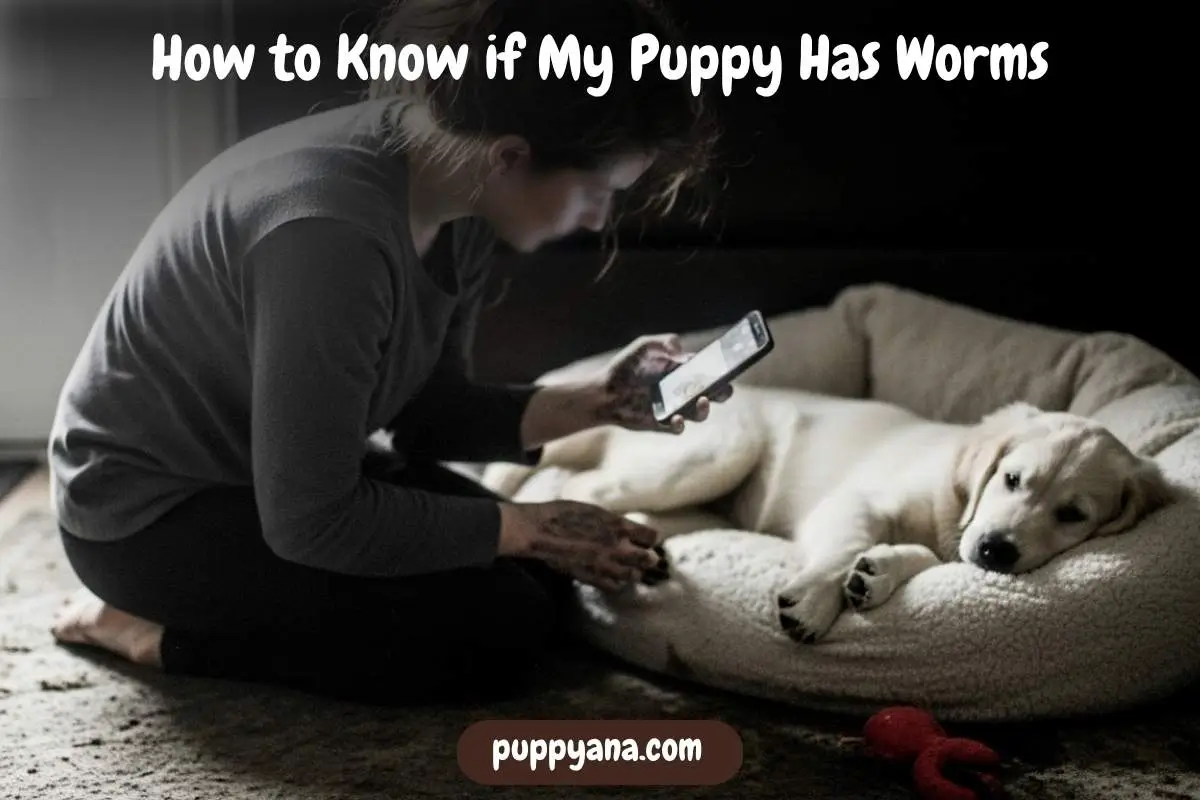Your puppy suddenly starts chewing everything, the couch, your shoes, even your arm. Drooling, whining, and weird gum scratching with paws? Yep, your pup is teething.
Just like human babies, teething is a perfectly normal part of puppy development, but it can be uncomfortable, frustrating, and sometimes painful for both of you.
In this guide, we’ll walk through when do puppies stop teething, how to help them during the process, what signs to expect, and which chew toys, treats, and tools can make things easier.
Let’s help you and your puppy, get through it.

Table of Contents
ToggleWhen Do Puppies Start and Stop Teething?
Most puppies begin teething at around 3 weeks of age, but if you bring your pup home at 8 weeks, you’re starting right in the middle of this process.
Quick Stage Breakdown:
- 2–4 weeks: Baby (deciduous) teeth start to come in
- 5–6 weeks: All baby teeth (28 total) are typically in
- 12–16 weeks: Teething begins as baby teeth fall out
- 4–6 months: Adult teeth pushing through
- 6–8 months: Teething usually ends
So, when do puppies stop teething exactly?
Most puppies stop teething by 6 to 8 months, though large breeds may take a bit longer to fully settle. By then, they’ll have 42 permanent adult teeth.
According to the AKC teething guide, signs of teething may still show up beyond 6 months as molars finalize.
Signs Your Puppy Is Teething
Here’s how to tell if your puppy is in the thick of teething:
Teething Symptoms:
- Constant chewing (especially on harder surfaces)
- Red or swollen gums
- Excessive drooling
- Mild bleeding in the mouth
- Whining or irritability
- Loss of baby teeth (can stick to toys or fall randomly)
- Gum scratching with paws
- Temporary loss of appetite (from gum discomfort)
These signs are totally normal. Teething isn’t usually dangerous, but always monitor for chewing on harmful items or signs of infection.
Can You Tell When a Puppy Is Done Teething by Looking?
Sometimes you don’t need a calendar, you just need to look inside your puppy’s mouth. So, how do you know when do puppies stop teething based on appearance?
Here’s what to check:
Visual Indicators:
- No more wiggly teeth when touching
- Only adult-sized teeth visible (42 total)
- Gums no longer appear swollen or red
- Breath improves slightly (from infection-free adult gums)
- Chewing becomes focused, not frantic
Gum health checkups can confirm the completion of adult tooth eruption. Our experts recommend a routine mouth inspection around 8 months to verify full teething progression.
Puppy Teething Timeline by Month
Here’s a helpful view of the full process so you aren’t caught off guard:
Puppy Teething Month-by-Month:
| Age (Weeks) | Development |
|---|---|
| 3–6 weeks | Baby teeth start erupting |
| 6–8 weeks | Full deciduous set forms |
| 12–16 weeks | Baby teeth start falling out |
| 4–6 months | Adult teeth push in |
| 6–8 months | Teething ends, permanent teeth in place |
Remember, when do puppies stop teething? Usually around 6 to 8 months, but observe your dog’s behavior for signs of lingering discomfort after that.
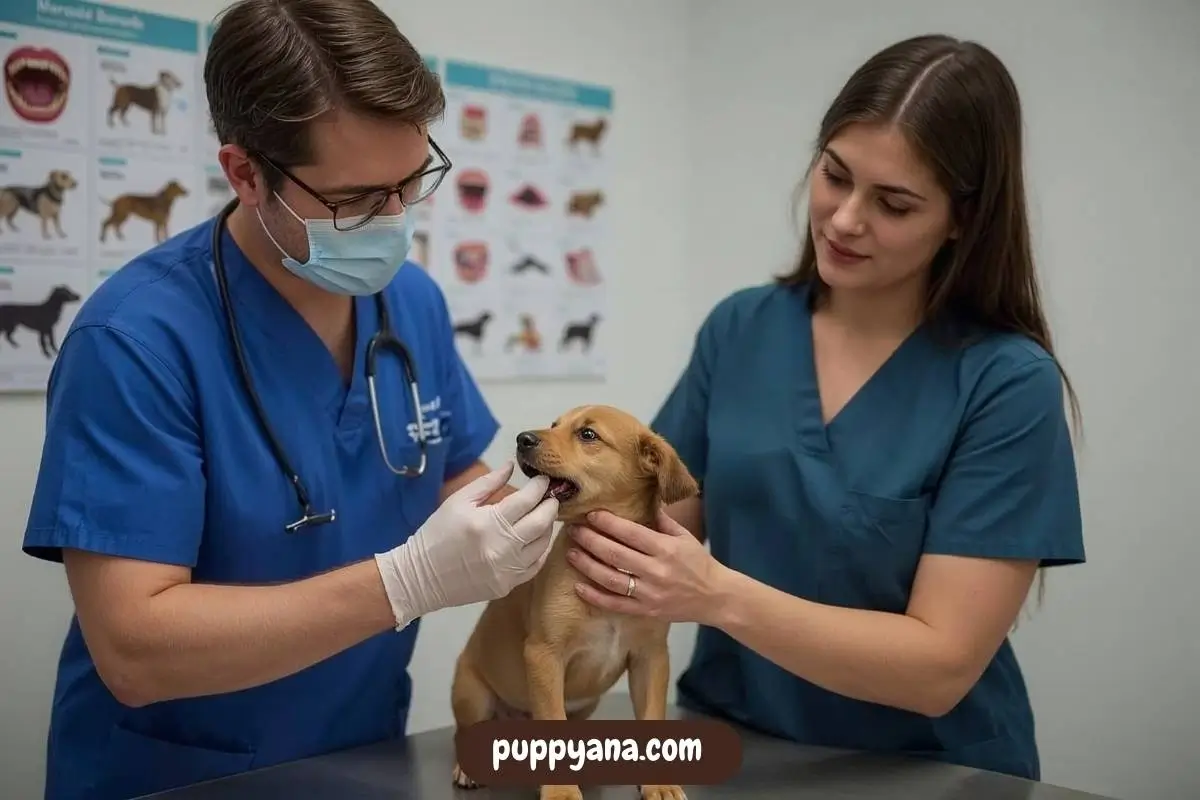
When Do Puppies Stop Teething Compared to Human Babies?
Understanding the teething process is easier when compared to something familiar, like human babies.
Many dog owners ask: “When do puppies stop teething compared to infants?” The truth is, puppies grow much faster.
Side-by-Side Snapshot:
| Category | Puppies | Human Babies |
|---|---|---|
| Start losing teeth | 12–16 weeks | 6–8 months old |
| Complete teething | 6–8 months old | Around 2–3 years old |
Puppies teethe more intensely and rapidly, which means they chew things with purpose. They don’t just soothe, they also explore and build jaw strength.
Use this comparison to adjust your expectations and build patience when managing your chewer.
What to Do During Puppy Teething
Now that you know when do puppies stop teething, let’s cover what you should do during those important months.
Must-Do Care Tips:
- Offer safe chewable toys at all times (KONG, Nylabone, Benebone)
- Avoid letting them chew hard bones or furniture legs
- Keep shoes, cords, and remote controls out of reach
- Rinse chew toys regularly to remove saliva buildup
- Gently soothe gums with frozen carrots or a cold washcloth
- Use positive reinforcement when your puppy chooses the right object to chew
Best Teething Toys and Tools for Puppies
Puppies love to chew more during teething, so redirecting that urge is key to saving your sanity.
PuppyAna recommends the following tools:
- Frozen KONGs packed with banana or pumpkin purée
- Rubber textured teething rings
- Freeze-dried treats with chewing resistance
- Soft plush toys for gumming days
- Dog-safe veggies like chilled carrots (not baby carrots—too small!)
Rotating chew textures every few days to keep your puppy interested and avoid overuse of any one toy or jaw pattern.

When Do Puppies Stop Biting Everything?
Biting and teething go hand-in-hand.
Though teething typically ends by 6–8 months, many puppies continue to explore with their mouths longer, especially if they’re untrained or overstimulated.
Tips to End Nipping:
- Say a firm “No bite” and redirect to a toy
- Use reward-based training systems
- Avoid rough-hand play that excites the bite reflex
- Rotate toys and play types
- Use “time-outs” if your pup gets overstimulated
Understanding when do puppies stop teething helps you realize biting is often a short-lived development phase, not a sign of aggression.
Is Your Puppy Losing Teeth Too Fast or Too Slow?
It’s normal to lose teeth randomly. But if your pup seems to skip teething milestones, here’s what to check:
Key Red Flags:
- Baby teeth don’t fall out by 7 months
- New teeth grow behind baby teeth (double rows)
- Gum looks infected or swollen longer than 48 hours
- Foul breath paired with excessive drool
- No chewing behavior at all during the expected months
Double rows are called retained deciduous teeth, and they need to be removed by a vet.
Taking your puppy to their 6-month wellness exam helps identify delayed growth and dental concerns.
What Not to Do During Teething Phase
When your pup is teething, mistakes can slow progress or cause harm.
Avoid:
- Giving real bones, antlers, or hard objects
- Using bitter apple spray to stop chewing (it masks behavior, doesn’t correct it)
- Punishing puppy for chewing
- Pulling loose teeth (they should fall out naturally)
- Overstimulating with rough toys if gums are sore
We guide pet parents to use only soft to moderate resistance products, especially during molar growth between 4–6 months.
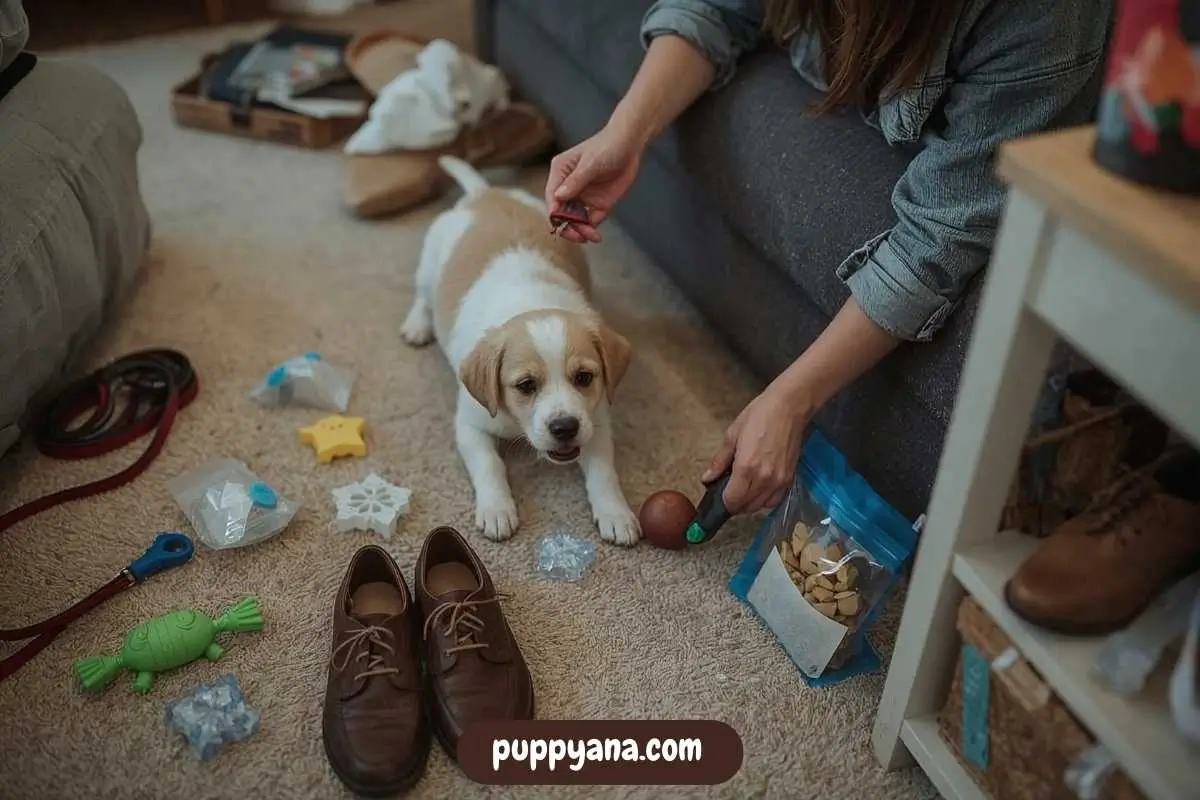
When Do Puppies Stop Teething Based on Size and Breed?
Just as breed impacts growth timeframes, it helps answer when do puppies stop teething as well.
Breed Categories & Teething Completion:
- Toy Breeds (e.g. Chihuahua, Shih Tzu): Finish earlier – around 6 months
- Medium Breeds (e.g. Cocker Spaniel, Border Collie): 6–7 months
- Large and Giant Breeds (e.g. Labrador, Great Dane): 7 to 9+ months
Larger breeds tend to:
- Keep chewing behaviors longer, even post-teething
- Develop strong jaws that need a daily outlet
- Require chew-resistant toys suited to the weight class
Breed-specific timelines help tailor your chew-proofing strategies at home.
Do All Breeds Stop Teething at the Same Time?
Not exactly. Breed size affects both teething intensity and timeline.
Breed Differences:
- Small breeds may complete teething by 6 months
- Medium breeds: 6–7 months on average
- Large/giant breeds: some may show signs until 8–10 months
Toy breeds can experience more dental crowding. Bully breeds may show longer chewing habits due to jaw development.
Ask your vet if breed-specific care tips might help with:
- Toothbrush training
- Chew type
- Treat size adjustment
What Happens If a Puppy Doesn’t Teethe Normally?
Not all puppies follow a perfect clock. Occasionally, dental development is delayed or uneven, which may signal something deeper.
Wondering when do puppies stop teething—if at all? Talk to your vet if:
Watch for:
- Baby teeth that haven’t fallen out by 7–8 months
- Unable to chew solid food comfortably
- Teeth growing sideways or misaligned
- Persistent bad breath or excess drooling
- Lumps around the jawline
These can indicate:
- Gum inflammation
- Retained deciduous teeth
- Jaw crowding (common in brachycephalic breeds)
- Tooth root infections (less common, but serious)
PuppyAna encourages owners to request a dental check during spay/neuter visits around 6–9 months, when sedation allows a deep look at hidden dental issues.
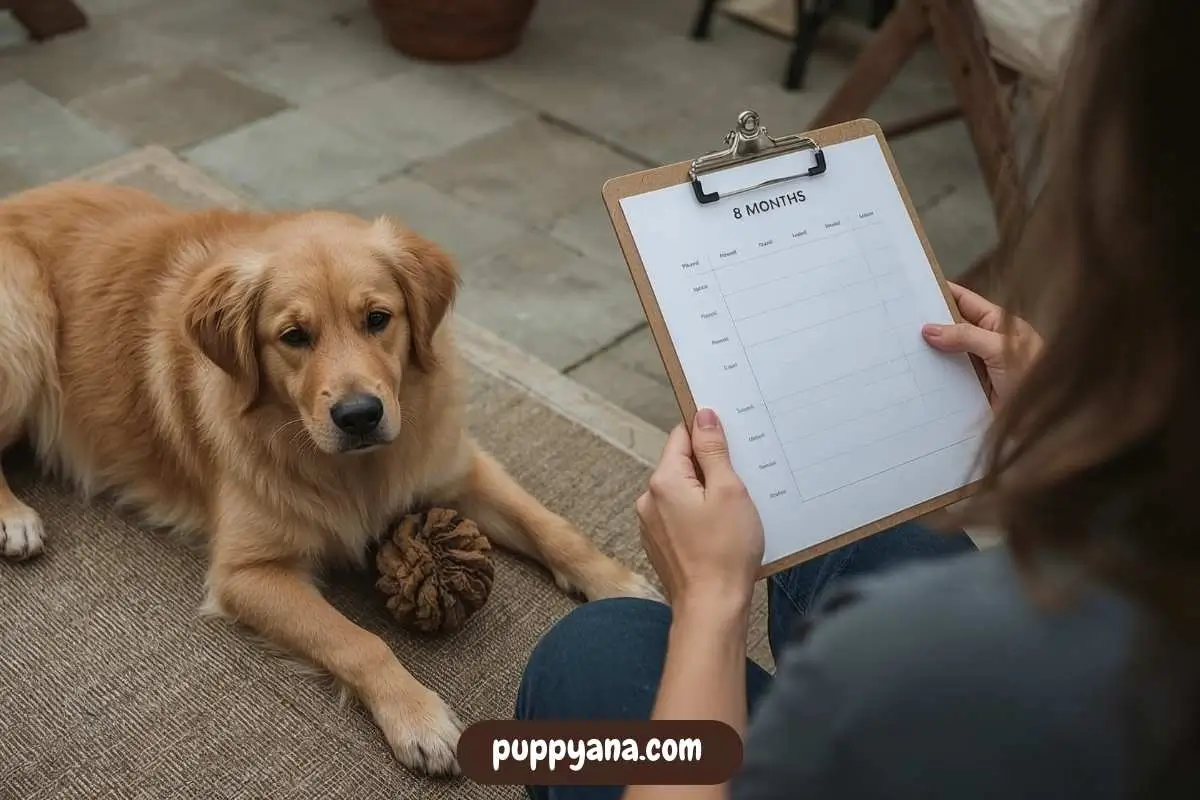
Conclusion
So, when do puppies stop teething?
Most puppies complete teething between 6–8 months of age, but chewing and biting behaviors can last longer depending on training and breed.
Here’s what matters more:
- Watch for key signs and symptoms
- Offer consistent, appropriate chew outlets
- Avoid hard or unsafe toys
- Support your pup with vet visits, safe tools, and encouragement
Teething is a short phase, but it’s a big step in your dog’s development.
PuppyAna reminds new puppy parents: teething is temporary—your bond is forever. Stay patient, keep positive, and step into the adult stage together.
Frequently Asked Questions
When do puppies stop teething completely?
Most stop teething between 6 to 8 months, with all adult teeth in place.
Can puppies lose teeth at 12 weeks?
Yes, 12–16 weeks is when baby teeth fall out and teething begins.
Should I brush my puppy’s teeth during teething?
Yes, gently brush with soft bristles and pet-safe toothpaste 2–3 times per week.
How do I soothe a teething puppy at night?
Use frozen toys, low-light environments, soft music, and calming pet chews.
What if my puppy still bites a lot after teething ends?
It could be a behavioral or attention issue, not teething. Use training, redirection, and enrichment.

